|
|
|
Sort Order |
|
|
|
Items / Page
|
|
|
|
|
|
|
| Srl | Item |
| 1 |
ID:
166686
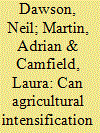

|
|
|
|
|
| Summary/Abstract |
Market-oriented agricultural intensification is a major development strategy, yet its alignment with sustainable development goals (SDGs) is unclear. We apply indicators for SDG 2 (eradicate hunger) regarding income, food production, food security and land tenure to recent intensifications in Rwanda and Laos to reveal their disaggregated impacts. We find while market-oriented intensification may generate poverty reduction, it also exacerbated marginalisation and poverty through various forms of land tenure insecurity. Ethnicity and gender were influential factors in Rwanda, and post-conflict resettlement policies in Laos. We discuss implications for development practice and selection of suitable indicators to reflect the ambition of the SDGs.
|
|
|
|
|
|
|
|
|
|
|
|
|
|
|
|
| 2 |
ID:
166685
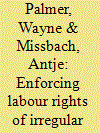

|
|
|
|
|
| Summary/Abstract |
The multi-directional nature of labour migration flows has resulted in an increasing number of countries having become both senders and receivers of regular and irregular migrants. However, some countries continue to see themselves primarily as senders and so ignore their role as a receiving country, which can have negative implications for the rights of migrants in their territory. Using the example of Indonesia, which is State Party to the 1990 UN Convention on the Rights of All Migrant Workers and Their Families, this article demonstrates that irregular migrant workers in this country have the legal right to protection against labour exploitation even when they work despite the government’s prohibition on employment. The article discusses the ‘right to work’ and how international human rights law has translated it into the ‘right to protection from labour exploitation’ for irregular migrants in Indonesia. By way of two case studies about the Indonesian government’s handling of irregular migrants, it shows how it prioritises enforcement of the employment immigration law over labour and employment laws much like countries that have not ratified the ICRMW. It also draws attention to legal protection gaps that emerge for asylum seekers when they are recognised to be genuine refugees.
|
|
|
|
|
|
|
|
|
|
|
|
|
|
|
|
| 3 |
ID:
166681


|
|
|
|
|
| Summary/Abstract |
Over the last two decades, billions in aid money has been spent in highly insecure regions of conflict affected states in the hope that aid would lead to less violence and more stability. A recent wave of academic work on the impact of aid on violence has now amassed convincing empirical evidence that this hope is futile. Aid injected in highly insecure regions, where violence is a reality and insurgents retain some capacities, will increase, not dampen violence. This essay first provides a summary of the findings of the recent empirical literature. It then demonstrates that two causal mechanisms – predation and sabotage – explain why aid in highly insecure settings will likely lead to less, not more, stability. The essay then exemplifies these two causal mechanisms, using original qualitative and quantitative data from Afghanistan. It ends with a discussion of the implications for donors engaged in countries affected by conflict.
|
|
|
|
|
|
|
|
|
|
|
|
|
|
|
|
| 4 |
ID:
166687


|
|
|
|
|
| Summary/Abstract |
This paper revisits Bangladesh’s ‘double paradox’ – sustained macroeconomic growth despite the poor state of governance and a high level of corruption – by critically reviewing trends in governance and corruption indicators during 1990–2017 vis-à-vis other South Asian countries. In addition, we draw upon data from a purposefully designed survey of manufacturing firms to assess the state of economic governance in the export-oriented ready-made garments (RMG) sector, the country’s main source of foreign exchange and driver of economic growth. Consistent with the country’s poor ranking in a host of indicators of investment climate and corruption perception, in-depth interviews of RMG factory owners confirm the high cost of doing business in various forms. We also find no evidence of growth-mediated improvements in indicators of governance. On the contrary, our review of print media reports suggests a growing governance deficit in the country’s financial sector. We conclude by discussing the implications of our findings for the country’s future growth as well as performance of the RMG sector.
|
|
|
|
|
|
|
|
|
|
|
|
|
|
|
|
| 5 |
ID:
166684
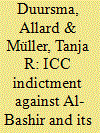

|
|
|
|
|
| Summary/Abstract |
The impact of the International Criminal Court (ICC) on peace processes has received much scholarly attention. We argue, based on the ICC arrest warrant against Sudanese President Omar al-Bashir, that ICC indictments against government officials not only can be detrimental to the prospects for peace, but can also negatively affect everyday practices of peacekeepers and humanitarian workers. We draw on a combination of quantitative and qualitative data in order to develop our argument. We interrogate some measurable consequences of the indictment in relation to the work of the United Nations – African Union Mission in Darfur (UNAMID) as well as humanitarian actors in Darfur. We do so using a data set compiled to support the work of UNAMID. We also draw on interviews with UN and UNAMID staff, aid workers, and representatives of the conflict parties. Our analysis shows that the indictment of President al-Bashir was perceived by the Sudanese government as the continuation of a confrontational approach pursued by the international community. We further show that the indictment accelerated patterns of obstruction and intimidation of peacekeeping actors, other third-party actors, and local staff associated with these. This complicated the everyday activities of peacekeepers and humanitarian efforts.
|
|
|
|
|
|
|
|
|
|
|
|
|
|
|
|
| 6 |
ID:
166690
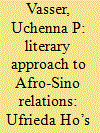

|
|
|
|
|
| Summary/Abstract |
The Afro-Sino engagement supports the study of international relations beyond the framework of a West-centric narrative. Ken Kamoche’s fictionalisation of African immigrants in China, and Ufrieda Ho’s narration of the vicissitudes of Chinese communities in South Africa, contemplate the consequence of the Africa–Asia engagement on the human condition. While the attendant political apparatuses in the African continent and China laud the mutual benefits of engagement, Kamoche and Ho, by focusing on issues of transmigration, displacement and belonging, identity-formation, and so forth expose the acute Sinocentrism and Afrocentrism that impede the seamless establishment of migrant communities in both geopolitical spaces. The principal objectives of this essay involve a close reading of Kamoche and Ho’s novels to focus on the non-state participants of the Afro-Sino relations, and to discuss the emerging transnational, migrant literature that is at once African and Chinese. Ultimately, this essay suggests the formulation of a literary subgenre to embrace the Afro-Sino literary imagination.
|
|
|
|
|
|
|
|
|
|
|
|
|
|
|
|
| 7 |
ID:
166682
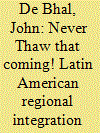

|
|
|
|
|
| Summary/Abstract |
Existing accounts of the US–Cuba Thaw correctly identify the decisiveness of Latin American states in pushing the 2014 change in US policy towards Cuba. Problematically, however, these accounts overlook a range of regional integration projects pursued by Latin American states that prove pivotal in ascertaining the central dynamics of the region in shaping the Thaw. This article argues that these regional integration projects are imperative to understanding how Latin American states were able to alter US policy towards Cuba, for three reasons. First, these initiatives, and Cuba’s role in these projects, are central to understanding why Cuba came to be a unanimously ‘regional’ issue for Latin American states of all political persuasions; second, the challenges to US dominance in the region provided by these integration projects were ultimately what gave Latin American states their teeth in pushing the Obama administration to reconsider its policy towards Cuba; and third, a consideration of this broader regional context more thoroughly illustrates the strategic nature of the change in policy towards Cuba as an attempt by the US to salvage its ability to influence regional affairs in response to these integration initiatives that excluded it from the region’s architecture.
|
|
|
|
|
|
|
|
|
|
|
|
|
|
|
|
| 8 |
ID:
166688
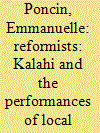

|
|
|
|
|
| Summary/Abstract |
To make sense of the gap between the theory and practice of community-driven development (CDD), development scholars and practitioners have proposed that the success of interventions is relative to the reform-mindedness of local government officials. This article sheds some light on the good governance performances of local government officials as part of the CDD programme Kalahi in the province of Bohol, Philippines. It highlights that locally, mayors who styled themselves as reformists enjoyed heightened power and electoral victories. In parallel, the province experienced a pattern of ‘growth with immiserisation’ and persistent political clientelism wrapped in a discourse of pro-poor development.
|
|
|
|
|
|
|
|
|
|
|
|
|
|
|
|
| 9 |
ID:
166683
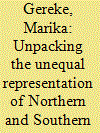

|
|
|
|
|
| Summary/Abstract |
Limited research has been done on non-governmental organisation (NGO) heterogeneity and its representation in global governance. Using the example of international climate change politics, we demonstrate that Northern and Southern NGOs tend to pursue different perspectives which are very unevenly represented in international climate change negotiations as NGOs from the Global North still constitute the large majority of NGOs taking part in these negotiations. In contrast to more hopeful outlooks, NGOs, hence, do not automatically contribute to a more democratic and legitimate global governance.
|
|
|
|
|
|
|
|
|
|
|
|
|
|
|
|
| 10 |
ID:
166689


|
|
|
|
|
| Summary/Abstract |
This paper considers the ramifications of the fact that a majority of (Jewish) Israeli citizens no longer considers the Israeli military occupation of the Palestinian territory of the West Bank to be an ‘occupation’. Informed by qualitative research conducted in Israel and the occupied territory of the West Bank, the paper argues the case for understanding of this process of social legitimation as being rooted in complex structures of cultural processes and practices grounded in ideological and religious beliefs. Identifying Zionism as an ethno-national ideology, located within the wider ethno-national impulse of nineteenth century Europe, the paper further investigates a number of cultural processes that have led to the domestic justification and rationalisation of occupation in the Israeli public consciousness and consequently, the legitimisation of continued occupation. These cultural practices are inherently highly political, constituting a long-term strategy aimed at maintaining the occupation. The paper argues that this strategy is articulated not only by cultural practices of ethnonationalism and identity politics, but ultimately by various acts and facets of violence.
|
|
|
|
|
|
|
|
|
|
|
|
|
|
|
|
|
|
|
|
|